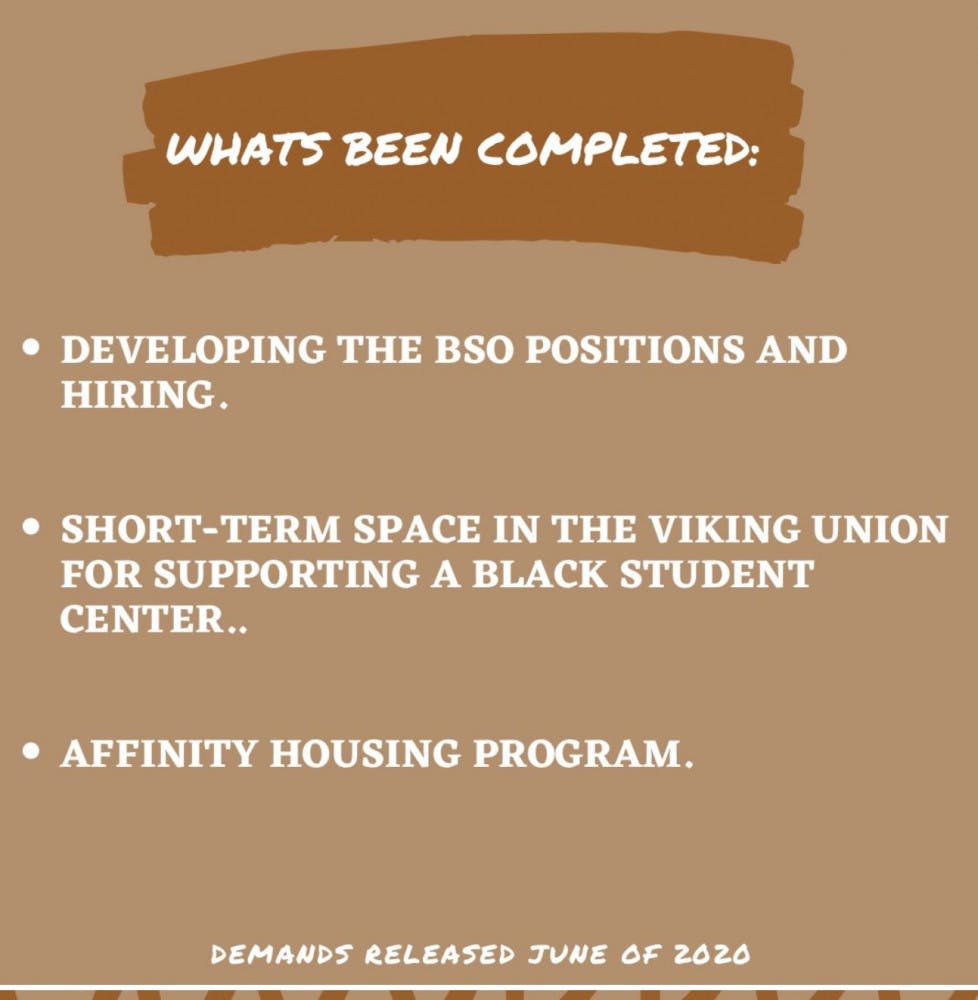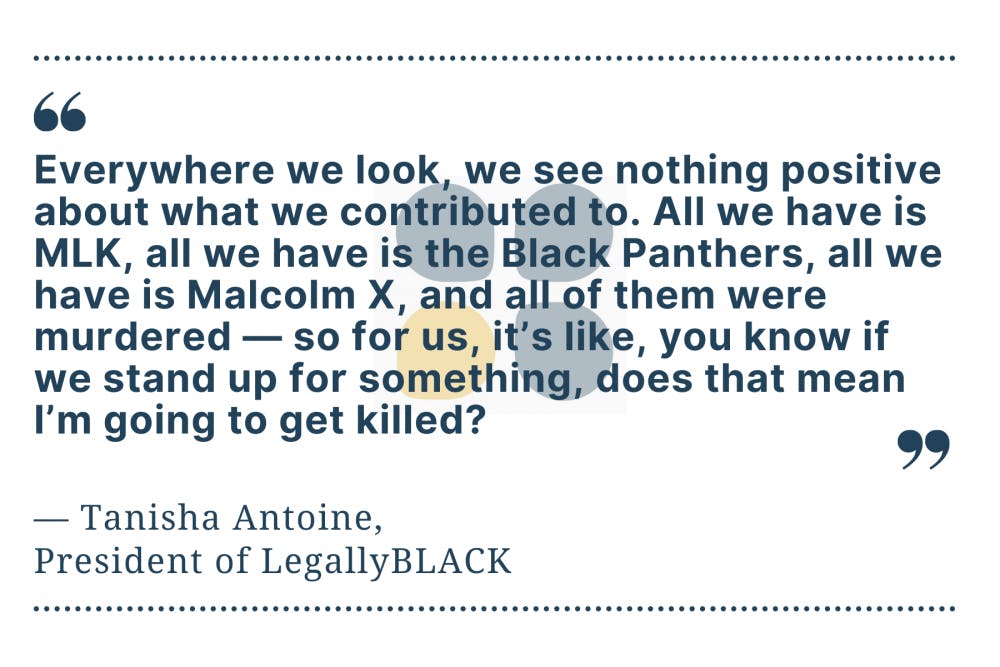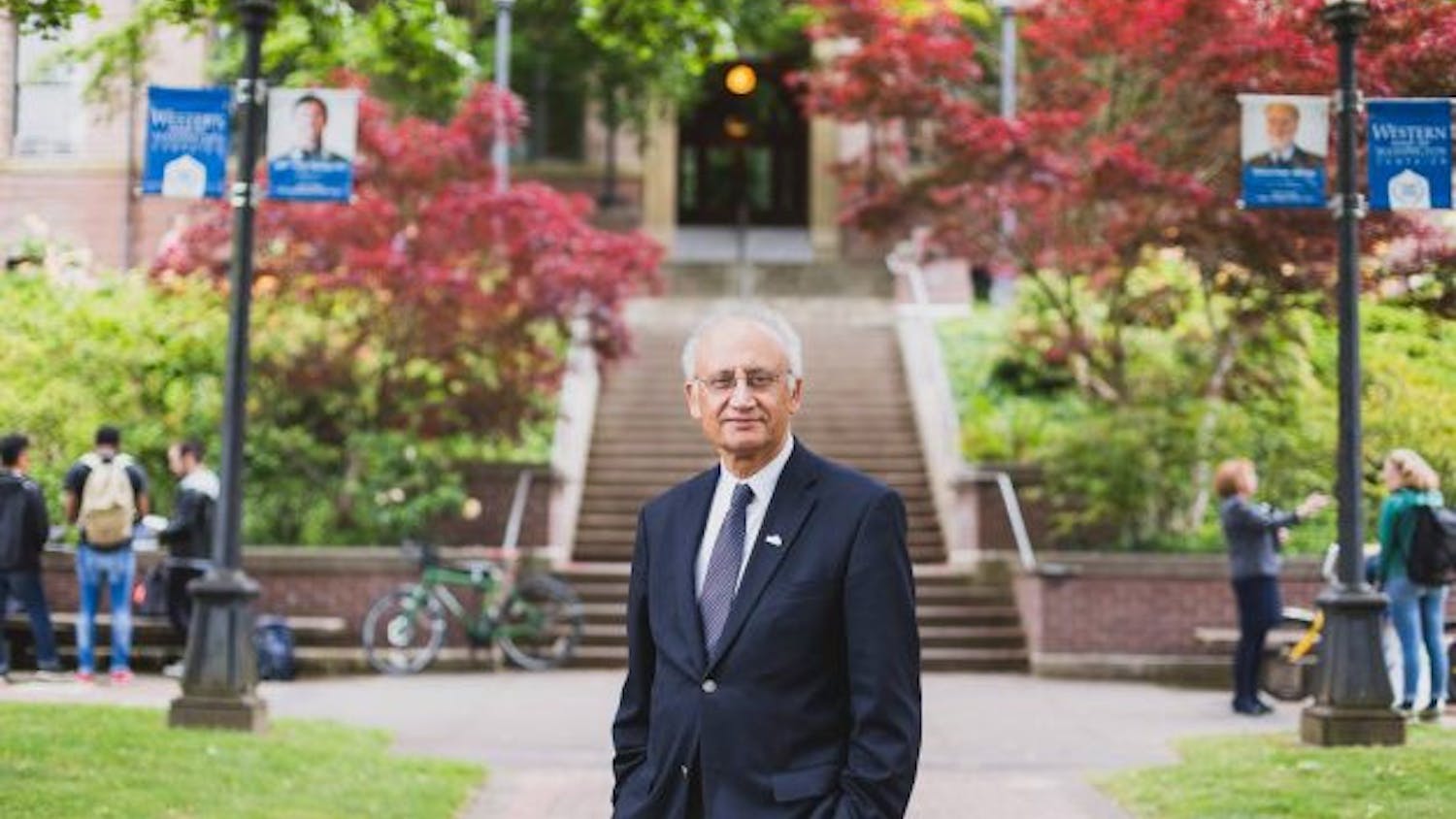
Please Note: We only include phonetic spellings by request of the source.
The Black Student Organization is marking the one-year anniversary of its founding with a renewed call for the fulfillment of the demands they made to the Viking Union Organization and the Western Washington University Administration on Juneteenth, 2020.
A group of Black students formed the BSO last spring, which culminated in a list of formal demands for improved practices and new resources in the Associated Students Organization and all Western programs.
When the demands were introduced, they enjoyed a great deal of support and enthusiasm from students, faculty and staff, said AS President Abdul-Malik Ford, a Black-Muslim man who is the former president of the Black Student Union and one of the original signers of the BSO demands.
“It was like, OK, this is very hopeful, people have actually got their boots rattled and are finally ready to make change happen after decades and decades of countless demands by students, Black students, and people of color,” Ford said.
A scattered response
The BSO is a coalition of all the Black student groups and clubs to work towards common goals, such as the creation and fulfillment of the demands for increased accessibility and equity for Black students, according to Ford. The Black Student Union is a club under the umbrella of the BSO that promotes cultural awareness and action for social change, according to the BSU’s profile.
In response to the demands, the university renamed the new dorm building, formerly Highland Hall, Alma Clark Glass Hall after the first Black student who attended Western and began creating a Black affinity space there, according to Ford. The Legacy Review Task Force was created to find a new name for the College of the Environment, which is currently named for Thomas Huxley, an English biologist who published at least one paper promoting the subsequently debunked claim that that the average Black individual is inferior to the average white individual.
But since then, the demands have been addressed in a scattered fashion and lack the representation by Black students that was originally demanded, Ford said. Western’s director of University Communications Paul Cocke said in an email to The Front on April 15 that the fulfillment of the BSO’s demands “is continuously informed and shaped by feedback from the campus community, particularly our students.”
Lydia Ashenafie, a BSO coalition development specialist and fourth-year sociology major, pointed out that communication with Black students often comes in the form of words with little action.
“In certain areas, there seems to be a gap between words and actions,” Ashenafie said. “As a coalition we have received a lot of verbal support and kind words, however it doesn’t always translate to how support looks in terms of representation and action.”
More Black counselors
LaShaiah Dickerson, a Black student who is a BSO development specialist and vice president of the Black Student Union, said that mental health for Black students is one area that the university has fallen short.
In their demands, the BSO told the university to hire two Black mental health counselors trained to help students grapple with the burden of anti-Black racism, paid for with a funding cut from the University Police.
Vice President of Enrollment and Student Services Melynda Huskey said the university cannot legally advertise a position or hire based on race under both state and federal laws. But, there are ways to satisfy the demand while hiring based on experience and merit, she said.
“When we think about how we achieve the goal without violating the law, we look for mental health counselors who have demonstrated experience working in a diverse, multicultural environment,” Huskey said. “We look for people who have documented research and training on the specific challenges of African American students in predominantly white institutions.”
Cocke said the university’s budget process is not set up to cut funding for one department, such as the University Police, to fund other items because of its holistic nature.
“The University provides funding to various departments through a bottom-up budget process that looks at all priorities of the university and provides funding accordingly,” Cocke said.
The Counseling Center is actively searching for three new counselors to fill vacancies, including a new position for a Multicultural Resiliency Specialist, said Counseling Center Director Sarah Godoy. The position requires experience working with “Black and/or Native students,” and the Counseling Center intends to create more of these positions in the future, Godoy said in an email.
The university is also searching for a retention counselor for Black and African American students, according to the Accessibility, Diversity, Equity and Inclusion timeline. This is in addition to, not in replacement of, increased mental health services for students of color, according to Huskey.
A frustrating wait
But, other demands remain unaddressed, such as the creation of a cross-cultural education required for every student in every department, Ford said.
Tanisha Antoine, an African American woman who is president of LegallyBLACK, said that a lack of education about the contributions by Black people or people of color to a given field can add to the kind of trauma that necessitates therapy.

According to Huskey, the university cannot require every department to offer a course without confirmation that they have the faculty to teach it. Courses required for all Western students have to be vetted by the Academic Coordinating Committee, which makes determinations about General University Requirements, Huskey said.
The university organized the Committee on Undergraduate Education Task Force that met last summer to put together a recommendation for the Academic Coordinating Committee to create the general university requirement demanded by the BSO, according to the DEI Timeline.
Stakeholder-based procedures like this are one of the reasons why some of the demands aren’t being fulfilled within the one-year timeline originally demanded by the BSO, Huskey said. Legally mandated public comment and review periods are required for any changes to university policy, which push the timeline for alterations out to 18 months.
“I know that it’s incredibly frustrating for a student who looks at that 18 months and thinks ‘that’s 50 percent of my time as an actively engaged student on this campus, potentially, just to get one change to a policy,” Huskey said. “And by the time it’s done, it may not even look exactly like what I wanted it to look like because it’s gone through so many different revisions.”
For demands that call for changes to the working conditions of faculty and staff, the university must conduct renegotiations for their contracts, which can also take more than a year, Huskey said. The university is in the process of negotiating new faculty and staff contracts with the Washington Federation of State Employees, Public School Employees and United Faculty of Western Washington University this year, she said.
Representation — and paid compensation
Representation by Black students would likely help the university understand what Black students deal with and help respond to those issues in a way that matches what Black students demand and need, said Mwangi (Mwah'-ghee) Payton, an African-American and Mûgìkûyû (mo-gei-koh-yoh) Kenyan student who is a BSO coalition development specialist.
“I believe that, within any Eurocentric institution, standards on how to properly let people of color’s voices be heard must be set,” Payton said. “Far too often, our messages, cultures, and goals are reduced to harmful overgeneralizations that leave us unsatisfied and sometimes even offended.”
One way that Western could facilitate communication would be to create a website that lists out each demand, updates on progress from the people working on each demand and who to contact for more information, Ford said.
Ford said that he would also like to see collaboration on a campus-wide newsletter with monthly updates on progress for the fulfillment of demands to improve communication.
“We look forward to working with the university to bridge that gap,” Ashenafie said.
During the “Talk with Sabah” event on April 28, President Sabah Randhawa said a new Office of Equity is in the process of being created. It will have a Chief Diversity Officer who will work directly with student groups to identify key equity issues around campus, Randhawa said.
Ashenafie and Ford both stressed the need for paid representation for the time-intensive, important work Black students do to make the university more equitable and accessible. According to Huskey, paid positions may not align with the goals of activists because it requires oversight from supervisors and directors, plus the university’s biennial budget is lower due to COVID-19.
So far, three paid Black Student Coalition development specialist positions have been created. Their main role is to help guide the fulfillment of BSO demands specific to the AS, such as the creation and design of a dedicated space for Black students in the Viking Union, Ford said.
According to Payton, these positions expire at the end of the summer, which could be problematic for the long term outlook of the BSO demands.
“The issue is that the three of us are yet to be guaranteed permanent positions,” Payton said, “Our jobs have only been set until summer which jeopardizes the entire list of demands and the Black student experience at Western.”
The AS Executive Board has been working on the reallocation of funding to fulfill the Black Student Coalition’s demand for $36,000 for culturally and historically significant Black holidays, Black student conferences, Black student clubs and other resources, Ford said.
Dickerson said that this progress makes her hopeful.
“We’ve only gotten so many things accomplished in a span of a year,” Dickerson said. “I know we all hoped that we would be a lot further, but I’m proud of the progress that we have made.”
The Front has been reporting on the BSO demands from June 2020. Read more of our coverage here and here.
Jacob O’Donnellis a junior majoring in environmental policy and public relations. He is currently a campus news reporter for The Front and typically writes about issues related to the environment and social justice. He can be reached at jacobodonnell.thefront@gmail.com.





